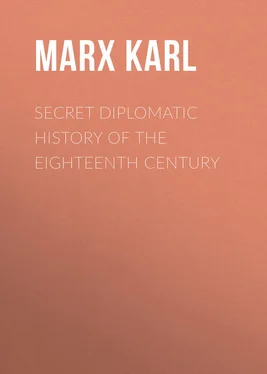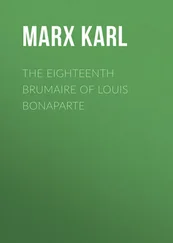Karl Marx - Secret Diplomatic History of The Eighteenth Century
Здесь есть возможность читать онлайн «Karl Marx - Secret Diplomatic History of The Eighteenth Century» — ознакомительный отрывок электронной книги совершенно бесплатно, а после прочтения отрывка купить полную версию. В некоторых случаях можно слушать аудио, скачать через торрент в формате fb2 и присутствует краткое содержание. Жанр: literature_19, foreign_antique, foreign_prose, на английском языке. Описание произведения, (предисловие) а так же отзывы посетителей доступны на портале библиотеки ЛибКат.
- Название:Secret Diplomatic History of The Eighteenth Century
- Автор:
- Жанр:
- Год:неизвестен
- ISBN:нет данных
- Рейтинг книги:4 / 5. Голосов: 1
-
Избранное:Добавить в избранное
- Отзывы:
-
Ваша оценка:
- 80
- 1
- 2
- 3
- 4
- 5
Secret Diplomatic History of The Eighteenth Century: краткое содержание, описание и аннотация
Предлагаем к чтению аннотацию, описание, краткое содержание или предисловие (зависит от того, что написал сам автор книги «Secret Diplomatic History of The Eighteenth Century»). Если вы не нашли необходимую информацию о книге — напишите в комментариях, мы постараемся отыскать её.
Secret Diplomatic History of The Eighteenth Century — читать онлайн ознакомительный отрывок
Ниже представлен текст книги, разбитый по страницам. Система сохранения места последней прочитанной страницы, позволяет с удобством читать онлайн бесплатно книгу «Secret Diplomatic History of The Eighteenth Century», без необходимости каждый раз заново искать на чём Вы остановились. Поставьте закладку, и сможете в любой момент перейти на страницу, на которой закончили чтение.
Интервал:
Закладка:
9 9 Horace Walpole characterises his epoch by the words – " It was the mode of the times to be paid by one favour for receiving another. " At all events, it will be seen from the text that such was the mode of Russia in transacting business with England. The Earl of Sandwich, to whom Sir George Macartney could dare to address the above despatch, distinguished himself, ten years later, in 1775, as First Lord of the Admiralty, in the North Administration, by the vehement opposition he made to Lord Chatham's motion for an equitable adjustment of the American difficulties . "He could not believe it (Chatham's motion) the production of a British peer ; it appeared to him rather the work of some American ." In 1777, we find Sandwich again blustering: "he would hazard every drop of blood, as well as the last shilling of the national treasure, rather than allow Great Britain to be defied, bullied, and dictated to, by her disobedient and rebellious subjects." Foremost as the Earl of Sandwich was in entangling England in war with her North American colonies, with France, Spain, and Holland, we behold him constantly accused in Parliament by Fox, Burke, Pitt, etc., "of keeping the naval force inadequate to the defence of the country; of intentionally opposing small English forces where he knew the enemy to have concentrated large ones; of utter mismanagement of the service in all its departments," etc. (See debates of the House of Commons of 11th March, 1778; 31st March, 1778; February, 1779; Fox's motion of censure on Lord Sandwich; 9th April, 1779, address to the King for the dismissal of Lord Sandwich from his service, on account of misconduct in service; 7th February, 1782, Fox's motion that there had been gross mismanagement in the administration of naval affairs during the year 1781.) On this occasion Pitt imputed to Lord Sandwich "all our naval disasters and disgraces." The ministerial majority against the motion amounted to only 22 in a House of 388. On the 22nd February, 1782, a similar motion against Lord Sandwich was only negatived by a majority of 19 in a House of 453. Such, indeed, was the character of the Earl of Sandwich's Administration that more than thirty distinguished officers quitted the naval service, or declared they could not act under the existing system. In point of fact, during his whole tenure of office, serious apprehensions were entertained of the consequences of the dissensions then prevalent in the navy. Besides, the Earl of Sandwich was openly accused, and, as far as circumstantial evidence goes, convicted of Peculation. (See debates of the House of Lords, 31st March, 1778; 9th April, 1779, and seq. ) When the motion for his removal from office was negatived on April 9th 1779, thirty-nine peers entered their protest.
"(Private.)
" … On my arrival here I found the Court very different from what it had been described to me. So far from any partiality to England, its bearings were entirely French. The King of Prussia (then in possession of the Empress' ear) was exerting his influence against us. Count Panin assisted him powerfully; Lacy and Corberon, the Bourbon Ministers, were artful and intriguing; Prince Potemkin had been wrought upon by them; and the whole tribe which surrounded the Empress – the Schuwaloffs, Stroganoffs, and Chernicheffs – were what they still are, garçons perruquiers de Paris . Events seconded their endeavours. The assistance the French affected to afford Russia in settling its disputes with the Porte, and the two Courts being immediately after united as mediators at the Peace of Teschen, contributed not a little to reconcile them to each other. I was, therefore, not surprised that all my negotiations with Count Panin, from February, 1778, to July, 1779 , should be unsuccessful, as he meant to prevent, not to promote, an alliance. It was in vain we made concessions to obtain it. He ever started fresh difficulties; had ever fresh obstacles ready. A very serious evil resulted, in the meanwhile, from my apparent confidence in him. He availed himself of it to convey in his reports to the Empress, not the language I employed, and the sentiments I actually expressed, but the language and sentiments he wished I should employ and express. He was equally careful to conceal her opinions and feelings from me; and while he described England to her as obstinate, and overbearing, and reserved, he described the Empress to me as displeased, disgusted, and indifferent to our concerns; and he was so convinced that, by this double misrepresentation, he had shut up every avenue of success that, at the time when I presented to him the Spanish declaration, he ventured to say to me, ministerially, ' That Great Britain had, by its own haughty conduct, brought down all its misfortunes on itself; that they were now at their height; that we must consent to any concession to obtain peace; and that we could expect neither assistance from our friends nor forbearance from our enemies. ' I had temper enough not to give way to my feelings on this occasion… I applied, without loss of time, to Prince Potemkin, and, by his means, the Empress condescended to see me alone at Peterhoff. I was so fortunate in this interview, as not only to efface all bad impressions she had against us, but by stating in its true light, our situation, and the inseparable interests of Great Britain and Russia, to raise in her mind a decided resolution to assist us. This resolution she declared to me in express words. When this transpired – and Count Panin was the first who knew it – he became my implacable and inveterate enemy. He not only thwarted by falsehoods and by a most undue exertion of his influence my public negotiations, but employed every means the lowest and most vindictive malice could suggest to depreciate and injure me personally; and from the very infamous accusations with which he charged me, had I been prone to fear, I might have apprehended the most infamous attacks at his hands. This relentless persecution still continues; it has outlived his Ministry. Notwithstanding the positive assurances I had received from the Empress herself , he found means, first to stagger, and afterwards to alter her resolutions. He was, indeed, very officiously assisted by his Prussian Majesty, who, at the time, was as much bent on oversetting our interest as he now seems eager to restore it. I was not, however, disheartened by this first disappointment, and, by redoubling my efforts, I have twice more, during the course of my mission, brought the Empress to the verge (!) of standing forth our professed friend , and, each time, my expectations were grounded on assurances from her own mouth . The first was when our enemies conjured up the armed neutrality; 10 10 Sir James Harris affects to believe that Catherine II. was not the author of, but a convert to, the armed neutrality of 1780. It is one of the grand stratagems of the Court of St. Petersburg to give to its own schemes the form of proposals suggested to and pressed on itself by foreign Courts. Russian diplomacy delights in those quæ pro quo . Thus the Court of Florida Bianca was made the responsible editor of the armed neutrality, and, from a report that vain-glorious Spaniard addressed to Carlos III., one may see how immensely he felt flattered at the idea of having not only hatched the armed neutrality but allured Russia into abetting it.
the other when Minorca was offered her. Although, on the first of these occasions, I found the same opposition from the same quarter I had experienced before, yet I am compelled to say that the principal cause of my failure was attributable to the very awkward manner in which we replied to the famous neutral declaration of February, 1780. As I well knew from what quarter the blow would come, I was prepared to parry it. My opinion was: 'If England feels itself strong enough to do without Russia, let it reject at once these new-fangled doctrines; but if its situation is such as to want assistance, let it yield to the necessity of the hour, recognise them as far as they relate to Russia alone, and by a well-timed act of complaisance insure itself a powerful friend. ' 11 11 This same Sir James Harris, perhaps more familiar to the reader under the name of the Earl of Malmesbury, is extolled by English historians as the man who prevented England from surrendering the right of search in the Peace Negotiations of 1782-83.
My opinion was not received; an ambiguous and trimming answer was given; we seemed equally afraid to accept or dismiss them. I was instructed secretly to oppose, but avowedly to acquiesce in them , and some unguarded expressions of one of its then confidential servants, made use of in speaking to Mr. Simolin, in direct contradiction to the temperate and cordial language that Minister had heard from Lord Stormont, irritated the Empress to the last degree, and completed the dislike and bad opinion she entertained of that Administration. 12Our enemies took advantage of these circumstances … I suggested the idea of giving up Minorca to the Empress, because, as it was evident to me we should at the peace be compelled to make sacrifices, it seemed to me wiser to make them to our friends than to our enemies . The idea was adopted at home in its whole extent, 13 and nothing could be more perfectly calculated to the meridian of this Court than the judicious instructions I received on this occasion from Lord Stormont. Why this project failed I am still at a loss to learn. I never knew the Empress incline so strongly to any one measure as she did to this, before I had my full powers to treat, nor was I ever more astonished than when I found her shrink from her purpose when they arrived. I imputed it at the same time, in my own mind, to the rooted aversion she had for our Ministry , and her total want of confidence in them ; but I since am more strongly disposed to believe that she consulted the Emperor (of Austria) on the subject, and that he not only prevailed on her to decline the offer, but betrayed the secret to France, and that it thus became public. I cannot otherwise account for this rapid change of sentiment in the Empress , particularly as Prince Potemkin (whatever he might be in other transactions) was certainly in this cordial and sincere in his support, and both from what I saw at the time, and from what has since come to my knowledge, had its success at heart as much as myself . You will observe, my lord, that the idea of bringing the Empress forward as a friendly mediatrix went hand-in-hand with the proposed cession of Minorca . As this idea has given rise to what has since followed, and involved us in all the dilemmas of the present mediation, it will be necessary for me to explain what my views then were, and to exculpate myself from the blame of having placed my Court in so embarrassing a situation, my wish and intention was that she should be sole mediatrix without an adjoint ; if you have perused what passed between her and me, in December, 1780, your lordship will readily perceive how very potent reasons I had to imagine she would be a friendly and even a partial one. 14I knew, indeed, she was unequal to the task; but I knew, too, how greatly her vanity would be flattered by this distinction, and was well aware that when once engaged she would persist, and be inevitably involved in our quarrel, particularly when it should appear (and appear it would) that we had gratified her with Minorca. The annexing to the mediation the other (Austrian) Imperial Court entirely overthrew this plan. It not only afforded her a pretence for not keeping her word, but piqued and mortified her; and it was under this impression that she made over the whole business to the colleague we had given her, and ordered her Minister at Vienna to subscribe implicitly to whatever the Court proposed. Hence all the evils which have since arisen, and hence those we at this moment experience. I myself could never be brought to believe that the Court of Vienna, as long as Prince Kaunitz directs its measures, can mean England any good or France any harm. It was not with that view that I endeavoured to promote its influence here, but because I found that of Prussia in constant opposition to me ; and because I thought that if I could by any means smite this, I should get rid of my greatest obstacle. I was mistaken, and, by a singular fatality, the Courts of Vienna and Berlin seem never to have agreed in anything but in the disposition to prejudice us here by turns. 15The proposal relative to Minorca was the last attempt I made to induce the Empress to stand forth. I had exhausted my strength and resources; the freedom with which I had spoken in my last interview with her, though respectful, had displeased ; and from this period to the removal of the late Administration , I have been reduced to act on the defensive… I have had more difficulty in preventing the Empress from doing harm than I ever had in attempting to engage her to do us good. It was to prevent evil, that I inclined strongly for the acceptation of her single mediation between us and Holland, when her Imperial Majesty first offered it . The extreme dissatisfaction she expressed at our refusal justified my opinion; and I TOOK UPON ME, when it was proposed a second time, to urge the necessity of its being agreed to (ALTHOUGH I KNEW IT TO BE IN CONTRADICTION OF THE SENTIMENTS OF MY PRINCIPAL), since I firmly believed, had we again declined it, the Empress would, in a moment of anger , have joined the Dutch against us. As it is, all has gone on well ; our judicious conduct has transferred to them the ill-humour she originally was in with us, and she now is as partial to our cause as she was before partial to theirs. Since the new Ministry in England, my road has been made smoother ; the great and new path struck out by your predecessor, 16 and which you, my lord, pursue , has operated a most advantageous change in our favour upon the Continent. Nothing, indeed, but events which come home to her, will, I believe, ever induce her Imperial Majesty to take an active part; but there is now a strong glow of friendship in our favour; she approves our measures; she trusts our Ministry, and she gives way to that predilection she certainly has for our nation . Our enemies know and feel this; it keeps them in awe. This is a succinct but accurate sketch of what has passed at this Court from the day of my arrival at Petersburg to the present hour. Several inferences may be deduced from it. 17That the Empress is led by her passions, not by reason and argument; that her prejudices are very strong, easily acquired, and, when once fixed, irremovable; while, on the contrary, there is no sure road to her good opinion; that even when obtained, it is subject to perpetual fluctuation, and liable to be biassed by the most trifling incidents; that till she is fairly embarked in a plan, no assurances can be depended on; but that when once fairly embarked, she never retracts, and may be carried any length; that with very bright parts, an elevated mind, an uncommon sagacity, she wants judgment , precision of idea , reflection , and L'ESPRIT DE COMBINAISON(!!) That her Ministers are either ignorant of, or indifferent to, the welfare of the State, and act from a passive submission to her will, or from motives of party and private interests." 18
Интервал:
Закладка:
Похожие книги на «Secret Diplomatic History of The Eighteenth Century»
Представляем Вашему вниманию похожие книги на «Secret Diplomatic History of The Eighteenth Century» списком для выбора. Мы отобрали схожую по названию и смыслу литературу в надежде предоставить читателям больше вариантов отыскать новые, интересные, ещё непрочитанные произведения.
Обсуждение, отзывы о книге «Secret Diplomatic History of The Eighteenth Century» и просто собственные мнения читателей. Оставьте ваши комментарии, напишите, что Вы думаете о произведении, его смысле или главных героях. Укажите что конкретно понравилось, а что нет, и почему Вы так считаете.












